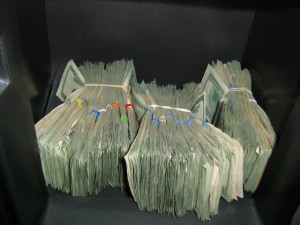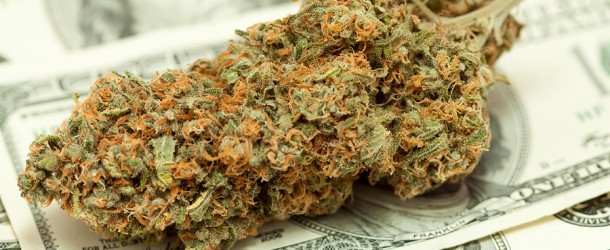Marijuana is a funny plant. It can help heal the sick, or land you in prison. Prison is probably not high on your bucket list. Preventing Suspicious Activities Reports (SAR) while conducting your legitimate personal and business banking is paramount to keeping federal agents out of your life.
Though marijuana’s acceptance as a legitimate medicine is gaining ground, the Federal Government still classifies cannabis as a schedule 1 drug and prosecutes those who grow and posses it. While your personal and business finances may be on the up and up, your banking activity can still trigger a Suspicious Activities Report. SAR’s often land on the desk of IRS agents who may choose to open an investigation and subpoena your bank records. As a grower or user of marijuana, the last thing you want is Federal Agents wandering around your house with a search warrant looking for something suspicious.
What Is A Suspicious Activities Report?
Every bank in the United States is required to follow a compliance program outlined in the Bank Secrecy Act and Anti-Money Laundering (BSA/AML). This means that any transaction (not just a currency transaction) that is made or attempted, by, at, or through a bank is monitored by bank employees. If a bank employee knows, suspects, or has reason to suspect a transaction, they are required to fill out and submit a SAR Form on the transaction. The criteria for suspicious transactions are as follows:
- Transactions suspected of involving funds derived from illegal activities or intended to hide or disguise funds or assets derived from illegal activities or to avoid any transaction reporting requirements under federal law.
- Transactions that have no apparent lawful purpose or are not the sort in which the particular customer would normally be expected to engage in.
Bank employees are trained to be watchful for unusual trends, activities, and changes in customer activities. They are watching you.
Red Flags: Activities to Avoid
- Large or frequent purchases of cashiers checks and travelers checks.
- Safe deposit entry after cash withdrawal or before a cash deposit
- Changing the amount of a cash transaction after finding out a Currency Transactions Reports (CTR) must be filed
- Making frequent cash transactions under $10,000
- Exchanging large amounts of currency from small to large bills
- Deposits of old, musty, mutilated currency (currency that smells like marijuana)
Bank employees may choose to file a SAR because of what you are wearing, your demeanor, something you said, because you asked questions about SAR’s and CTR’s or because you stated that you are trying to avoid taxes.
High Risk Industries
Various regulatory agencies have determined that the following industries have a high potential for money laundering activity. Medical marijuana patients and growers should be especially careful if they work in these industries.
- Check cashing facilities
- Leather stores
- New and used car and boat dealerships
- Travel agencies
- Brokers
- Precious metals and gems
- Auctioneers
- Pawn brokers
- Lawyers
- Accountants
- Investment brokers
- Telemarketers
- Casinos and card clubs
- Offshore corporations and banks located in tax and/or secrecy havens
- Import and export companies
- Deposit brokers
- Cash intensive businesses like convenience stores, restaurants, retail stores, and parking garages
- Ship, bus, and plane operators
What Happens to the SAR
 Not every SAR that is filled out ends up going to the IRS. At most banks, the SAR’s are filled out by the various employees and then given to a designated bank employee, often called the BSA officer. The reports are examined by the BSA officer who filters the information, combs through customers records, then determines which reports are in fact suspicious and should be passed along to the IRS.
Not every SAR that is filled out ends up going to the IRS. At most banks, the SAR’s are filled out by the various employees and then given to a designated bank employee, often called the BSA officer. The reports are examined by the BSA officer who filters the information, combs through customers records, then determines which reports are in fact suspicious and should be passed along to the IRS.
While most reports are left to the BSA officer’s discretion, reports of certain activity are required to be passed to the IRS for further investigation. These activity reports include:
- Known or suspected violation of federal law
- Suspicious transactions related to a money laundering activity
- Suspicious transactions related to a violation of the Bank Secrecy Act
- Insider abuse involving any amount
- Violations aggregating $5,000 or more where a suspect can be identified
- Violations aggregating $25,000 or more regardless of an potential suspect
- Transactions aggregating $5,000 or more that involve potential money laundering or violations of the Bank Secrecy Act
SAR’s that are passed along to the IRS can result in an immediate IRS audit of the bank customer. They may also result in a subpoena of your bank records for further examination, or may be filed away to be examined later for patterns or discrepancies.
Penalties For Failure to File a SAR
Just because almost any behavior can trigger a SAR, don’t think for a minute that this is just another busy work form that isn’t taken seriously by bank employees. Here are the penalties for failure to file a SAR.
“Any person who willfully violated the reporting requirements may be subject to criminal penalties with fines up to $250,000 or 5 years in jail.â€
I want to make it clear that I am not suggesting you involve yourselves in money laundering or tax evasion. However, legitimate medical marijuana growers and users do need to be extra careful with their bank activity. Legitimate but possibly “suspicious†activity at the bank can lead federal agents to your front door.
Bank Suspicion and Medical Marijuana,













New York State finally passed a medical marijuana law in June, 2012. Trying to find how to legally start a farm up here in the Mountains for Pharmacies. Little is found on how to even apply for a medical marijuana card. Messed up, pass a law that nobody has any clue on anything about!. Visit my site and contact me if you have ANY INFO about Medical Marijuana in New York State! ThankZ! Dean
Your best bet on solid information may be contact an attorney who specializes in New York cannabis law and knows the ropes in the county you plan to start your farm. If they can’t get you up to speed they can probably contact the local law enforcement or DA’s office for some guidance on your behalf.